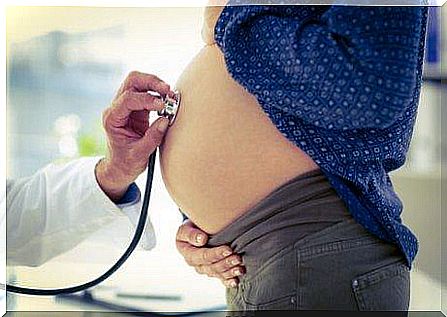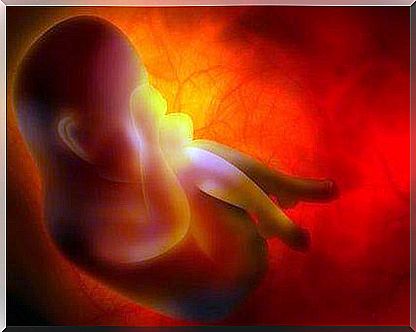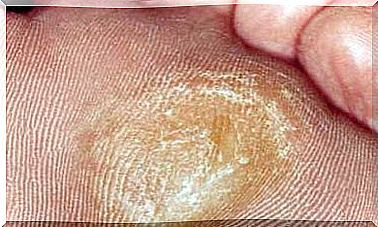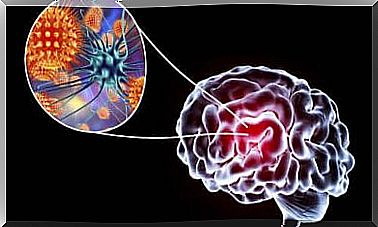All About Pregnancy Poisoning: Complication In Pregnant Women

Pregnancy poisoning is a complication during pregnancy that can occur from high blood pressure or liver damage among other things. It affects 5 – 8% of pregnant women and can be quite serious for both mother and baby.
Pregnancy poisoning usually shows up in the last trimester. But it can also show up during childbirth, in the second half of pregnancy or even in the first weeks after birth.
This condition can be mild or more severe. In addition, it can lead to a more serious condition, such as eclampsia or HELLP syndrome, if not treated properly or in a timely manner.
Why does preeclampsia occur?

Pregnancy poisoning occurs due to decreased blood flow to the placenta. Then the placenta will not be able to attach properly to the uterine wall and the arteries in this area will not develop as they should.
Chronic anemia and diabetes can also reduce the blood supply to the placenta. Some experts believe that pregnancy poisoning manifests itself in early pregnancy, even though the symptoms only develop later.
The symptoms of preeclampsia
Some women who have been diagnosed with preeclampsia do not develop the characteristic symptoms. Likewise, not all women develop the same symptoms.
The biggest problem is that some of the symptoms of preeclampsia, such as dizziness or swelling, can be interpreted as completely normal symptoms of pregnancy.
This is why doctors need to know how to see the danger signs of this complication effectively and in a timely manner.
They are:
In case of mild preeclampsia
- Hypertension
- Accumulation of water in the body
- Protein in the urine
In case of severe preeclampsia
- Headache
- Difficulty withstanding bright light
- Fatigue, dizziness and vomiting
- Decreased amount of urine
- Abdominal pain at the top, usually on the right side
- Bruising occurs easily
It is very important to remember that not all women with preeclampsia suffer from visible swelling or drastic weight gain. At the same time, not all women will suffer from preeclampsia just because they show these symptoms. The symptoms, as we mentioned above, can be a little confusing.
Risk factors for preeclampsia

Obesity, diabetes and high blood pressure are the major risk factors associated with preeclampsia.
Many other factors can also increase the risk. The woman will be more likely to suffer from this if it is the woman’s first pregnancy and she has previously suffered from high blood pressure or a kidney disease or has members of her family who have experienced it.
Similarly, there will be a higher risk for women with multiple pregnancies who have previously suffered from high blood pressure during pregnancy or preeclampsia or women with a BMI of 30 or more. Pregnant women under the age of 20 or over the age of 40 can also more easily develop preeclampsia.
Preventive measures
At the regular check-ups during pregnancy, the doctor will keep an eye on:
- Blood pressure
- Urine level
- Blood tests
In addition, there are other ways to check for the occurrence of this problem, such as:
- Tests that can detect blood clots and kidney function
- Sonograms
- Doppler ultrasound
Despite all these tests, there is not a stone safe way to avoid this disorder because not all factors that contribute to its way of manifesting can be controlled.
Therefore, experts usually recommend eating a balanced diet and exercising, just as it is important to get regular check-ups.
Treatment

Periodic check-ups during pregnancy provide the opportunity to detect this complication early along with many others.
Treatment depends on the stage of pregnancy. If this condition shows up close to the due date and the baby is fully developed, the doctors will probably start the birth as soon as possible.
If it is a mild preeclampsia and the baby is not fully developed, the treatment will be based on an increasing number of checks by the midwife. Similarly, your doctor will ask you to incorporate a diet high in protein.
It is also important to eat less salt and drink plenty of water. Finally, it is important to get plenty of rest. The patient should lie on his left side so that the child does not press on the important blood vessels.
If a woman suffers from severe preeclampsia, doctors may prescribe medication to control blood pressure in addition to the other treatments mentioned.
Pregnancy poisoning is an important complication during pregnancy that can put life at risk for both mother and her unborn baby. Therefore, a healthy lifestyle, especially while pregnant, as well as regular check-ups, are the best ways to avoid it.









